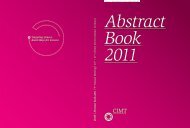Abstract Book 2010 - CIMT Annual Meeting
Abstract Book 2010 - CIMT Annual Meeting
Abstract Book 2010 - CIMT Annual Meeting
Create successful ePaper yourself
Turn your PDF publications into a flip-book with our unique Google optimized e-Paper software.
061 Buchwald | New targets & new leads<br />
The ubiquitin-conjugase-8 targets active fms-like tyrosine<br />
kinase-3 for proteasomal degradation<br />
Marc Buchwald 1 , Thorsten Heinzel 1 , Frank D. Böhmer 2 , Oliver H. Krämer 1,3<br />
1 Friedrich-Schiller-University Jena, Center for Molecular Biomedicine Institute of Biochemistry and Biophysics<br />
2<br />
Friedrich-Schiller-University Jena, Center for Molecular Biomedicine Institute of Molecular Cell Biology,<br />
Hans-Knöll-Str. 2, D-07745 Jena, Germany<br />
3<br />
Friedrich-Schiller-University Jena, Center for Molecular Biomedicine, PD Dr. O. H. Krämer,<br />
Tel/Fax: 03641-949-362/949-352, e-mail: Oliver.Kraemer@uni-jena.de<br />
106<br />
The class III receptor tyrosine kinase FMS-like tyro-<br />
sine kinase 3 (FLT3) regulates normal hematopoiesis<br />
and immunological functions. Nonetheless, constitutively<br />
active mutant FLT3 (FLT3-ITD) causally<br />
contributes to transformation and is associated with<br />
poor prognosis of acute myeloid leukemia (AML)<br />
patients. Histone deacetylase inhibitors (HDACi)<br />
can counteract deregulated gene expression profiles<br />
and decrease oncoprotein stability, which renders<br />
them candidate drugs for AML treatment. However,<br />
these drugs have pleiotropic effects and it is often<br />
unclear how they correct oncogenic transcriptomes<br />
and proteomes. We report here that treatment of<br />
AML cells with the HDACi LBH589 induces the ubiquitin-conjugating<br />
enzyme UBCH8 and degradation<br />
of FLT3-ITD. Gain- and loss-of-function approaches<br />
demonstrate that UBCH8 and the ubiquitin-ligase<br />
SIAH1 physically interact with and target FLT3-ITD<br />
for proteasomal degradation. These ubiquitinylating<br />
enzymes though have a significantly lesser effect<br />
on wildtype FLT3. Furthermore, physiological and<br />
pharmacological stimulation of FLT3 phosphorylation,<br />
inhibition of FLT3-ITD auto-phosphorylation,<br />
and analyzing kinase-inactive FLT3-ITD revealed<br />
that tyrosine phosphorylation determines their proteasomal<br />
degradation. These results provide novel<br />
insights into anti-leukemic activities of HDACi and<br />
position UBCH8, which has been implicated primarily<br />
in processes in the nucleus, as a previously<br />
unrecognized important modulator of FLT3-ITD<br />
stability and leukemic cell survival.



